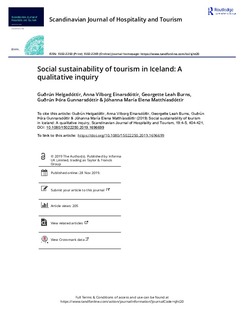| dc.contributor.author | Helgadóttir, Guðrún | |
| dc.contributor.author | Einarsdóttir, Anna Vilborg | |
| dc.contributor.author | Burns, Georgette Leah | |
| dc.contributor.author | Gunnarsdóttir, Guðrún Þóra | |
| dc.contributor.author | Matthíasdóttir, Jóhanna María Elena | |
| dc.date.accessioned | 2020-01-27T11:26:18Z | |
| dc.date.available | 2020-01-27T11:26:18Z | |
| dc.date.created | 2019-12-09T13:43:26Z | |
| dc.date.issued | 2019 | |
| dc.identifier.citation | Scandinavian Journal of Hospitality and Tourism. 2019, 19 (4/5), 404-421. | nb_NO |
| dc.identifier.issn | 1502-2250 | |
| dc.identifier.uri | http://hdl.handle.net/11250/2638040 | |
| dc.description | Published by Informa UK Limited, trading as Taylor & Francis Group This is an Open Access article distributed under the terms of the Creative Commons Attribution-NonCommercial-NoDerivatives License which permits non-commercial re-use, distribution, and reproduction in any medium, provided the original work is properly cited, and is not altered, transformed, or built upon in any way. | nb_NO |
| dc.description.abstract | Sustainability research in tourism increasingly focuses on social issues such as the relationship between resident quality of life and community resilience through adaptive capacity. This study of resident and tourism relations in Iceland contributes to this growing body of literature. The research was supported by the Icelandic Tourist Board to meet the need to monitor the social sustainability of tourism in Iceland. Observation in public spaces showed disruption in daily routines for residents as physical infrastructure filled with tourists and the activities of tourism enterprises. In-depth interviews revealed residents’ awareness of potential benefits and problems with tourism, but a positive experience of and attitude toward tourists. A concern for the well-being of tourists was a theme in the interviews. However, residents were critical of the tourism industry and tourism management in both the private and public sector and questioned the sustainability of tourism growth. This leads us to consider the concepts of quality of life and resilience and responsible tourism as aspects of how communities experience and cope with tourism. We conclude that social sustainability, understood as both procedural and substantive, is a useful concept in addressing issues in tourism development. | nb_NO |
| dc.language.iso | eng | nb_NO |
| dc.rights | Attribution-NonCommercial-NoDerivatives 4.0 Internasjonal | * |
| dc.rights.uri | http://creativecommons.org/licenses/by-nc-nd/4.0/deed.no | * |
| dc.subject | Bærekraft | nb_NO |
| dc.subject | Sustainability | nb_NO |
| dc.subject | Island | nb_NO |
| dc.subject | Iceland | nb_NO |
| dc.subject | Turisme | nb_NO |
| dc.subject | Tourism | nb_NO |
| dc.title | Social sustainability of tourism in Iceland: A qualitative inquiry | nb_NO |
| dc.type | Journal article | nb_NO |
| dc.type | Peer reviewed | nb_NO |
| dc.description.version | publishedVersion | nb_NO |
| dc.rights.holder | © 2019 The Author(s). | nb_NO |
| dc.subject.nsi | VDP::Samfunnsvitenskap: 200 | nb_NO |
| dc.subject.nsi | VDP::Social sciences: 200 | nb_NO |
| dc.source.pagenumber | 404-421 | nb_NO |
| dc.source.volume | 19 | nb_NO |
| dc.source.journal | Scandinavian Journal of Hospitality and Tourism | nb_NO |
| dc.source.issue | 4/5 | nb_NO |
| dc.identifier.doi | 10.1080/15022250.2019.1696699 | |
| dc.identifier.cristin | 1758286 | |
| cristin.unitcode | 222,57,1,0 | |
| cristin.unitname | Institutt for økonomi og IT | |
| cristin.ispublished | true | |
| cristin.fulltext | original | |
| cristin.qualitycode | 1 | |

